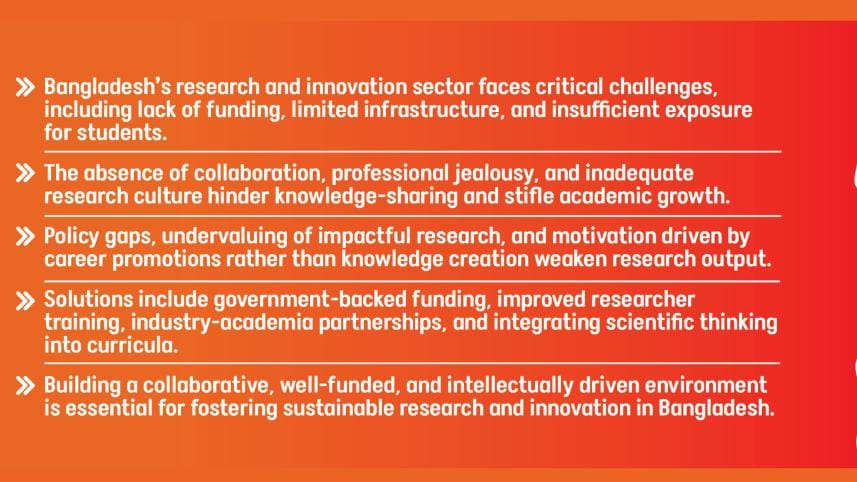How to build a conducive environment for innovation and research

In Bangladesh, academia is often one of the most overlooked aspects that has the potential to greatly contribute to the country's sustainable development. With the rise in the conversation of the causes of 'brain drain', it stands as a critically important point to talk about research and innovation alongside the many limitations to creating innovative new changes that hold us back. Moving forward, in order to create an environment conducive to these fields, it is crucial to address the many problems and the many ways we can tackle them.
Where does this problem start? Conducting research in Bangladesh is something students are usually exposed to in their undergraduate years, where many have the opportunity to work on a capstone 'thesis' project—conducting research on a particular project in their specific field of interest. The issue with this, however, is multidimensional. One of the biggest problems here is how many hurdles stand in front of you while you're attempting to carry out research work at an undergraduate level. Funding is a consistent issue, often resulting in university students not being able to spend enough time being exposed to the world of research. And while a master's degree or a PhD is available, what they offer can often seem lacklustre or insufficient. The biggest reason here is, of course, a lack of funding.

Mahir Amer, a student completing his Master's of Biological Sciences at the University of Edinburgh, raises this point, stating, "Anyone majoring in chemistry or the biological sciences will know that the reagents and chemicals we use on a daily basis are costly. The equipment we use also costs quite a lot. As a developing nation, the cold hard truth is that we can't invest as much into Research and Development as other countries." He further added, "The reason I chose the University of Edinburgh is because they have enough funding and resources to carry out cutting-edge research. They also hold lab meetings, section meetings, seminars, and a host of other activities on a frequent basis—which is something not often seen in our country."
This lack of funding and resources creates a host of different issues. Starting from limited exposure to research to sometimes spending your entire undergraduate years without ever dabbling in it, the grim reality is that our nation still has a long way to go before ensuring an environment where researchers can thrive. There is no singular solution to this, but it is important to recognise that government-backed funding—and even funding from external sources—will be crucial going forward. A greater emphasis must, thus, be placed on the necessity of it in our Research and Development sector.
Muhammad Ihsan-Ul-Karim, a Lecturer at the Institute of Health Economics at the University of Dhaka, suggests possible solutions, "Research infrastructure needs to be developed as required. For this, the government can provide conditional scholarship opportunities for students to obtain research-related skills from abroad, the condition being that they return to the country afterwards. Most importantly, salary structure with those having foreign PhD or equivalent degrees needs to be restructured, so that remuneration is comparable to that of our neighbouring countries at least. Otherwise, we're looking at more and more researchers leaving the country, leading to brain drain."
One tangential point to all of this is the need for university courses to promote scientific thinking alongside the learning of mere facts and knowledge. Ahnaf Yeanat Tazwar, a third-year student at North South University, says, "If a proactive approach was adopted where the coursework also delves into how a particular topic was discovered, the thought process behind it, what alternative ways could this problem be approached in, and its significance in our society, then we could pave the road for students to think more 'scientifically'."
Another aspect here is that while research can sometimes be expensive, that is frequently not the only thing holding us back. It is extremely crucial to understand that for research to thrive, the collaboration between individual researchers as well as amongst researchers and those who work in policy-making fields is of utmost importance.
Dr Ishrat Jabeen, Associate Professor at the Department of Biochemistry and Microbiology at North South University, says, "There is a need for direct involvement of scientists and innovators in properly addressing and framing their problems in order to receive proper support and to eventually aid in the formation of legitimate policies. This in turn will ensure a diversity of research perspectives and allow the presence of a broader discussion with citizens and stakeholders."

The lack of broad-scale discussions among researchers is, thus, one big hurdle that makes research more inaccessible than it needs to be. This problem, however, is often exacerbated by an absence of a collaborative spirit in a professional environment. Mahir Amer says, "I didn't know professional jealousy could get in the way of things this much until I tried to conduct research back home. I reckon most researchers keep hush-hush because they're afraid of getting stabbed in the back. However, this creates a very dry environment where researchers rarely host lab meetings, seminars, or even share ideas with others. As a result, undergraduate students are not properly exposed to the research work their faculty members are doing."
Dr Ishrat Jabeen raises a similar point, stating, "Apart from funding, the other aspects that hold us back are a lack of expertise, training, and a lack of research collaboration without personal incentives. Furthermore, underrepresentation in political institutions often gives people a feeling of inefficacy. At a policy level, our demands should be reasonably expected to be heard. The fact that it is not is a problem."
The policy aspect of this problem is not very easily defined. In order to understand it and, in turn, find solutions, it is necessary to dig a little deeper into the myriad problems that surround this field at a more administrative level. According to Dr Mahbubul H Siddiqee, Associate Professor of Microbiology at BRAC University, the problems are far more deeply rooted than just funding. Systemically, the reason research in Bangladesh rarely tends to have an impact at a policy level has to do with the motivations our researchers have.
Dr Mahbubul, who is also the Chair of the BRAC University Institutional Review Board, further elaborates, "One of the biggest issues with our research sector is the hypothetical carrot that we are chasing. What is our motivation for conducting research? The unfortunate reality is that the amount of time and effort it takes to carry out a research project in this country is far too harsh for the minuscule reward and respect that is obtained as a result of it. Thus, university faculty members in many places only focus on publishing papers—because that allows them to get a promotion. Many of these papers, unfortunately, are not really creating new knowledge or helping anyone. Our criteria for judging research, thus, shouldn't be counting the number of papers published, but seeing the number of patents they have established. Only then will research work be valued by all fronts."
One further problem that seems to be looming over researchers is the unfortunate yet very apparent skill gap among the scientists working today. Dr Mahbubul highlights this, stating that, "We need to establish more facilities to train our researchers, both young and new, to bring them all to the same level. I have seen many high-level scientists having no clue how to operate new tools and, on the flip side, fresh researchers simply do not have enough exposure or skills required for research. Both of these must be addressed at an institutional level."
The solution, then, is to establish further scopes of training and skill development. Unfortunately, most of the problems presented are very interlinked, and the system can only be improved once tackled holistically. If research is merely motivated by instantaneous profit, then attempting long-term changes will pose a big challenge. The bottom line here is that the problems are at our very foundations, and responding to them requires laying the groundwork for the future. Be it in humanities or STEM-related fields, these problems are nearly ubiquitous.
Sumaiya Tasnim, a Lecturer of the Department of English at BRAC University, says, "Bangladesh is hyper-focused on building a space that fosters profitability instead of intellectuality. Some aspects of research in the humanities remain unrecognised to the masses because there is a digression in the discourse surrounding rights, particularly regarding gender, women, and the working class. Of course, training and workshops are helpful, but what would be even better is having students and academics work with scholars to learn methods of researching and bringing new ideas to the humanities department."
Dr Salekul Islam, Professor at the Department of Computer Science and Engineering at United International University, shares some closing thoughts on the matter, highlighting the need for collaboration to create integrated systems for research work to be valued. "Combining research work with industrial needs is a way to tackle the issue of lack of funding, but that too needs to be done carefully and by analysing the needs of both academia and industry. Partnerships of different kinds will also help researchers grow."
The bottom line is clear: to move forward, it is imperative that innovators and researchers work to create a collaborative environment where scientific and analytical thinking is promoted. The culture of research must, thus, be built from the ground up in order to instill the necessity of it for generations to come. As a community, the pursuit and accessibility of knowledge should be nurtured in order to ensure that supervisors, as well as research officers, are both equipped with the tools required to carry out potentially groundbreaking research that will aid in the development of knowledge and tools useful for both the country and the world at large.
Raian Abedin is a poet, a contributor for The Daily Star, and a final-year student at North South University.



 For all latest news, follow The Daily Star's Google News channel.
For all latest news, follow The Daily Star's Google News channel.
Comments